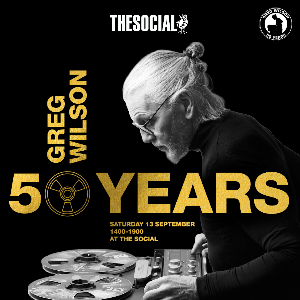Greg Wilson - 50 Years
The Social, London.

More information about Greg Wilson - 50 Years tickets
Greg Wilson started out as a DJ of the original disco era – his first paid booking as a mobile DJ in September 1975, before securing his inaugural club residency the following December, taking over the Saturday nights at the Chelsea Reach in New Brighton. Still 15 at the time, he’d turn professional on leaving school in the summer of ’76 – amongst the youngest working DJs in the country back then. The UK was under a Labour government, with Greg’s namesake, Harold Wilson its prime-minister. The Conservatives had changed their leader that year, with Margaret Thatcher becoming the first woman to head a major British political party. The US president was Gerald Ford, who’d replaced the disgraced Richard Nixon (forced to stand down following the Watergate scandal), with the fall of Saigon bringing the Vietnam War to an end that year. In football, Derby County were the reigning champions and West Ham United won the FA Cup, beating Fulham in an all-London final, with Fulham’s Alan Mullery having to settle for the consolation of being named Footballer of the Year. Bayern Munich were European champions, having beaten Leeds United in the final, Oleg Blokhin of Dynamo Kiev, then part of the Soviet Union, won the Ballon D'or, whilst West Germany were the most recent winners of the World Cup, in 1974. The biggest sporting event that year was arguably the ‘Thrilla in Manila’, when Muhammad Ali defeated Joe Frazier in their trilogy fight, remembered as one of the greatest in boxing’s history. A snapshot of the UK’s musical landscape that year would include artists like Elton John, Rod Stewart, Wings, Pink Floyd, David Bowie, Status Quo, Bay City Rollers, David Essex, 10cc, Led Zeppelin and Queen, plus US acts like The Eagles, The Stylistics and The Carpenters. Old-timers, Englebert Humperdinck, Jim Reeves and Perry Como would also top the UK chart with ‘Greatest Hits’ compilations, emphasising the breadth of music that British record buyers were consuming. Funk, which was played in all the best clubs, was largely absent from the chart – ignored by radio, apart from the few specialist soul shows of the time, with DJs like Greg Edwards and Robbie Vincent in London, Terry Lennaine on Merseyside and Andy Peebles in Manchester leading the way. For those in the know, the key funk acts included Earth, Wind & Fire, Ohio Players. The Commodores and Kool & The Gang, with Miami’s KC & The Sunshine Band basking in major commercial success with their infectious user-friendly funk. Disco was in evolution, drawing from soul and funk to create a genre designed for the nightclub. This was Gloria Gaynor’s reign as ‘the disco queen’, but by the end of the year a newcomer had announced her formidable presence, with Donna Summer destined to take the mantle. DJs played 7” singles and LPs, the 12” still to be introduced, whilst New York’s beatmatching innovations remained unknown to DJs here. Both Studio 54 and the Paradise Garage were yet to open, the NYC club scene still very much underground. The biggest US dance hit that year, by a country mile, was ‘Bad Luck’ by Harold Melvin & The Bluenotes. This was the era when The O’Jays, not the Bee Gees, symbolised disco music – the juggernaut of ‘Saturday Night Fever’, which would take disco square into the mainstream, still a few years off. From September 2025, and through into 2026, Greg will play a series of special dates both in the UK and overseas to celebrate the anniversary, covering a spectrum of dance.




